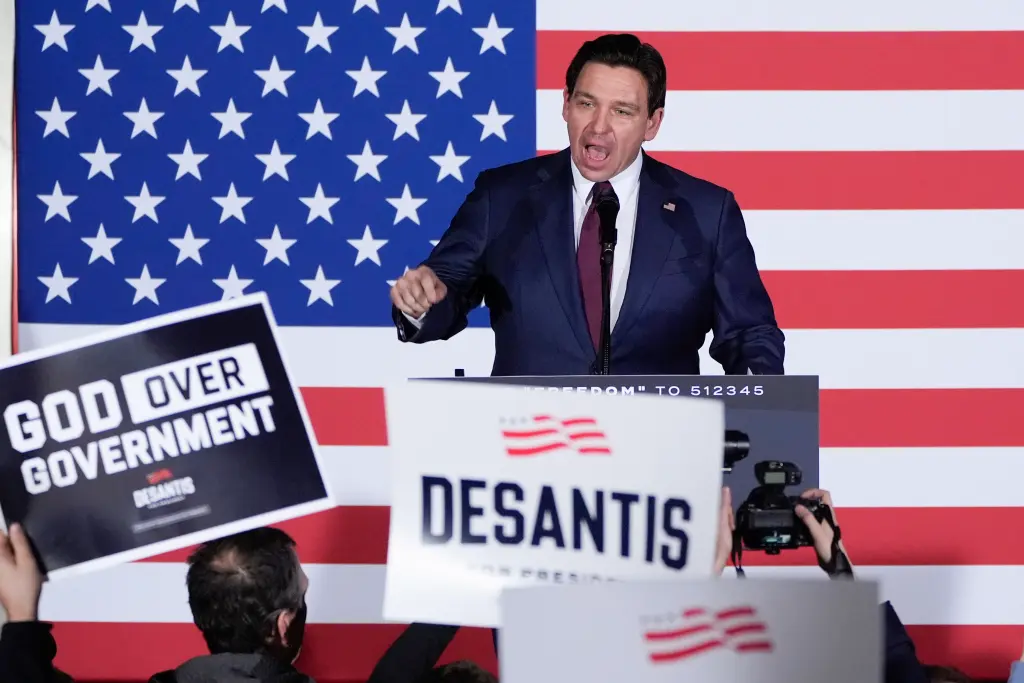Trump Gets Record Victory In Iowa Caucus
Former President Donald Trump gets record victory in Iowa caucus, solidifying his position as the undisputed frontrunner for the 2024 Republican presidential nomination.
Author:Dexter CookeReviewer:Hajra ShannonJan 17, 202428 Shares9.3K Views

Former President Donald Trump gets record victory in Iowa caucus, solidifying his position as the undisputed frontrunner for the 2024 Republican presidential nomination.
With 97% of the anticipated votes counted, Trump commanded an unprecedented 51.1% support, showcasing the largest margin of victory in the modern history of the Iowa GOP caucus.
DeSantis And Haley Follow, Ramaswamy Bows Out
Following Trump, Florida Gov. Ron DeSantis secured 21.2% support, while former South Carolina Gov. Nikki Haley claimed 19.1%. Biotech entrepreneur Vivek Ramaswamy, with 7.7%, gracefully exited the race, throwing his support behind Trump.
The 77-year-old former president's remarkable win marked the first time a Republican candidate achieved over 50% support in a contested Iowa caucus.
Trump asserted his dominance in Iowa by leading or winning in 98 out of the state's 99 counties. Johnson County, the only holdout, narrowly favored Haley.
The victory speech from Trump in Des Moines included congratulations to DeSantis and Haley, urging unity among Americans and paying tribute to his late mother-in-law, Amalija Knavs.
The early projection of Trump's victory stirred controversy, particularly with the DeSantis camp, accusing the media of unduly influencing the outcome.
Despite the accusations, Trump's substantial support across the state affirmed his position as the Republican front-runner, leaving DeSantis and Haley to navigate their campaign paths moving forward.
“„I want to congratulate Ron and Nikki for having a good time together. We’re all having a good time together. I think they both actually did very well. I really do. I think they both did very well.- Former President Donald Trump
“„I really think this is time now for everybody in our country to come together. We want to come together — whether it’s Republican or Democrat or liberal or conservative. It would be so nice if we could come together and straighten out the world and straighten out the problems and straighten out all of the death and destruction that we’re witnessing.- Former President Donald Trump

Trump's Appeal Reflected In Voter Sentiments
A pre-caucus survey revealed that 88% of Iowa Republicans sought "substantial change" or "total upheaval" in the country's governance, indicating a desire for disruption. The survey also highlighted immigration as the top concern for 40% of Iowa GOP voters, overshadowing economic considerations.
Trump's support was particularly robust in small towns and rural communities, where approximately 60% of Republican caucus-goers reside. He garnered significant backing from white evangelical Christians, constituting nearly half of GOP attendees, and those without a college degree.
DeSantis, who invested heavily in Iowa, fell short of overcoming Trump's popularity, expressing frustration at media influence.
Haley, vying for a top-three finish, set her sights on New Hampshire, anticipating a more moderate electorate. Despite Ramaswamy's exit, the race intensifies as the primary calendar moves forward.
As the Republican primary unfolds, Trump's victory underscores his enduring influence, challenging the notion of a contested GOP race.
The media and political apparatus grapple with the reality of Trump's continued dominance, mirroring his earlier triumphs that reshaped American politics.
Final Words
Donald Trump's resounding victory in the Iowa caucus solidifies his position as the leading contender for the 2024 Republican presidential nomination.
With historic support and unprecedented county dominance, Trump's influence remains unchallenged, reshaping the narrative of the GOP race.
The early projection controversy and challenges faced by DeSantis and Haley underscore the enduring impact of Trump's political legacy.
As the primary calendar advances, the spotlight remains on Trump, leaving pundits to grapple with the inescapable reality of his continued dominance in the Republican landscape.

Dexter Cooke
Author

Hajra Shannon
Reviewer
Latest Articles
Popular Articles